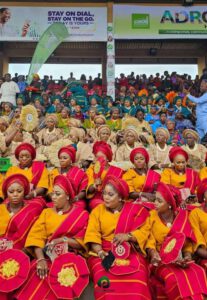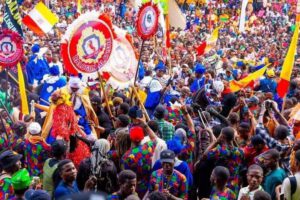By Festus Adedayo
Last Tuesday’s cultural display of the Ijebu people of Ogun State in their yearly Ojude Oba festival caught the eyes of the world. Translated as Festival of the King’s Courtyard, it has over the years been one of the most glamorous cultural and spiritual festivals held in Nigeria for over a century now. Many people have queried the rich sartorial depth and affluence of the Ijebu in the midst of Nigeria’s national ferment. Among Yoruba festivals, the glitz and colours associated with this festival place it outside the ranks of any cultural festival in Nigeria. Usually held to coincide with the Islamic Eid-l-adha ceremony, the festival holds on its third day.
Oral historical accounts put the emergence of the festival to Chief Kuku Oduyingbo, who later became Balogun of Ijebu, and or Imam Tunwatoba. Either or both, having recently converted to Islam, gathered friends, families, and well-wishers in homage to then Awujale, Oba Fidipote, who reigned around 1885. It was to appreciate him for the opportunity he gave them to practice Islam without hindrance. Ever since, thanks to Dr. Mike Adenuga’s Globacom which heavily funds the festival, Ojude Oba has transformed from being a Sallah homage into a cultural melting point for the Ijebu.
The Ojude Oba goes beyond the glamour of the participants’ dressing, or the equestrian display. Today, it speaks directly to the cultural, religious, social, and military significance of its yearly celebration. It is attended by over a million people. Apart from the visual niceties it brings, it also speaks to the importance of group association as the bedrock of development. You can see this in the gathering and parade of age grade societies called Regberegbe. Established in the 18th century, the age grade societies are known collectively as Wompari. The aim is to bring about amity among groups and ultimately, development into Ijebu land. Wompari is further broken into Egbe Gbobaniyi comprising male and female (1962-1964); Egbe Bobagunte male and female (1956-1958); Akile of Ijebu (1959-1961); Mafowoku, Egbe Arobayo male and female; Egbe Jagunmolu (1965-1967), Egbe Bobakeye, and Egbe Bobagbimo. Most of the Wompari are top industry barons, successful captains of industry and A-List professionals.

What Nigeria advertises to the world in Ojude Oba is cultural elegance and communal cohesion. It does same in the Argungu Fishing festival where showpieces are made of the hugest fish catches. Also in the mode of the Ojude Oba is the Durbar festival, an ancient traditional annual Hausa cultural, religious and equestrian festival which began in the 14th century. Native to northern Nigerian original ancient emirates of Kano, Katsina, Gombe and Akko, it is also celebrated in Sokoto, Zazzau, Bauchi and Bida. It rekindles Hausa’s ancient horsemen preoccupation in the Sahara and Sahel. Like the Ojude Oba, it is also a homage to the Emir and signposted by a colourfully mounted parade of the king’s retinue of horsemen. Musicians and artillerymen also add vibes to the festival.
Over the years, Nigerian creatives have also begun a renaissance to jumpstart the country’s creativity, especially in music. From African traditional music of Dan Maraya in Jos, Ogene songs of Oliver Decoque and Igbo highlife, a contemporary musical genre that combines highlife and Igbo traditional music, lifted into stardom by Chief Stephen Osita Osadebe, to the Yoruba Sakara, Juju and Apala music, Nigeria has evolved into gaining recognition on the global stage. Today, our boys advertise their craft on global audience stage and harvest audiences in the realm of millions. Tiwa Savage, Burna Boy, Davido, Wizkid, Rema, Asake, and many others are doing Nigeria proud in that regard. Blends of Afro beats and hip-hop parade artists like Plantashun Boiz, Def ‘O’ Clan, Remedies, Trybesmen with world class producers like OJB Jezreel. While they ply their trade at the global stage, these music wizards have also pushed our entertainment industry into becoming a major contributor to the Nigerian economy. Indeed, Nigeria’s entertainment industry is ranked “second-best entertainment and media consumer market” globally with the American music industry being the clear leader.

So, it becomes bothersome when news streaked in that the Nigerian government, represented by Hannatu Musawa, the Minister of Art, Culture, and Creative Economy, is entering into partnership with the American Grammy Awards to establish an African version of the Grammy Award. In a Global Music Industry Growth by Region rating, while Latin America had 21.5%, Asia 12.8%, Europe 6.2%, US/CAN 4.2%, MENA 19.8%, Sub-Saharan Africa had a whopping 28.8%. So why subordinate the master to his apprentice? The question to ask is, will this Africanization of the Grammy bring any good the way of Nigeria or her music industry? The answer is no. The idea is at best imperialist. There can be no two Grammy Awards. The original, which America monopolizes, has a high, if not total dosage of American music flavor. It prides itself as “the music industry’s highest honour” whereas our globally acclaimed musicians from Africa seldom crack its nut. It is why Nigerian superstars hardly win the Grammy. To have dross of Grammy in Africa as Musawa is contemplating is to accept the superiority and then inferiorize our own globally-sought music stars.
As a music enthusiast, I am convinced that what the Minister should be doing by now is to partner existing continental music award platforms which will strengthen and not overshadow them. African music awards institutions like South African Music Awards, (SAMA) Trace Awards, Headies, Ghana Music Awards (GMA), Soundcity MVP Awards, AFRIMA and such like will promote the continent’s music rather than this neo-colonial idea being toyed with by Musawa. She should also devise ways of revving the strides made by Ojude Oba, Durbar, Argungu and allied festivals into making those crafts recognized by the whole world. I hope the minister is listening?
* Adedayo is a newspaper columnist and public affairs analyst.